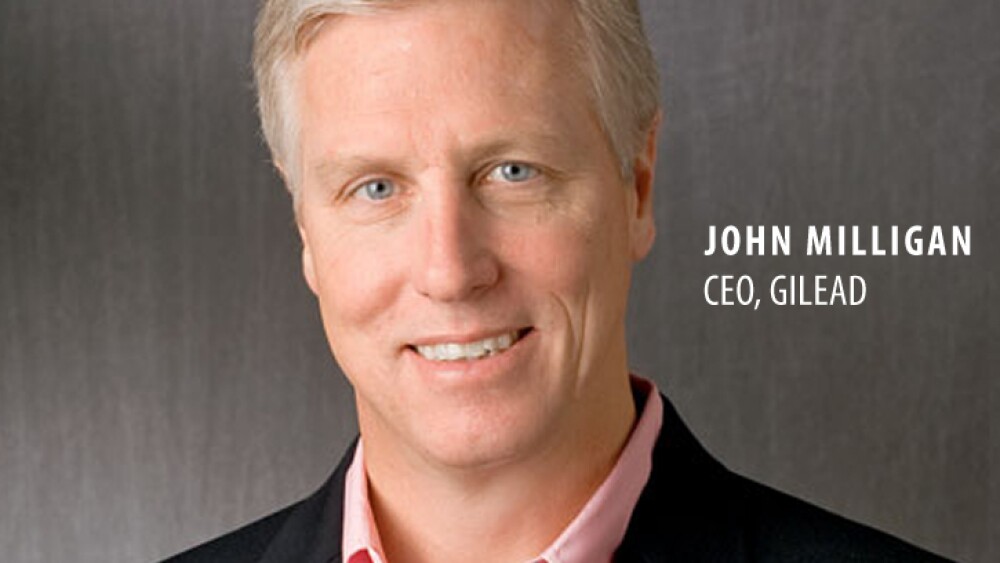May 9, 2016
By Mark Terry, BioSpace.com Breaking News Staff
It’s not exactly surprising that Foster City, Calif.-based Gilead Sciences is in the market for a possible acquisition. Gilead is in the enviable but complex position of having extremely effective drugs for hepatitis C in Harvoni and Sovaldi, which are so effective, basically curative, that they are creating a rapidly diminishing market. They are also starting to compete with drugs that aren’t necessarily more effective, but might be faster.
But last week, in an interview with Bloomberg, John Milligan, Gilead’s chief executive officer, said, “It’s time for us to go out and do important deals. We need some other assets that can bolster our pipeline.”
On April 24, rumors erupted that Gilead was considering buying New York-based Intercept Pharmaceuticals . This partially came about because on April 7, the U.S. Food and Drug Administration (FDA)’s Gastrointestinal Drugs Advisory Committee voted unanimously to recommend accelerated approval of Intercept’s Ocaliva (obeticholic acid) to treat primary biliary cirrhosis (recently renamed primary biliary cholangitis, or PBC). If approved, the drug will be the first to hit the market for the disease in 20 years. The FDA’s final decision is scheduled for May 29.
But Milligan indicates he wants to pick up an oncology asset. Overall, Gilead had three therapeutic areas he hopes to expand into, oncology, liver diseases and inflammatory disorders. Currently Gilead only has a single approved cancer drug, Zydelig, which has nasty side effects that limit its use. It doesn’t have an in-house oncology pipeline. Milligan told Bloomberg that Gilead has a “nascent oncology platform, but what I don’t yet see is a drug that we can rally around.”
But it does have cash, about $21.3 billion and short-term equivalent.
Milligan is also looking at nonalcoholic steatohepatitis (NASH), a fatty liver disease that affects more than 6 million people in the U.S. In-house, Gilead has four pipeline drugs for NASH, including an early-stage drug it bought last month for $400 million from Nimbus Therapeutics. Writing for Bidnessetc., Hadia Taqi said in April, “Gilead will be buying one of the half-dozen subsidiaries owned by Nimbus Therapeutics, called Nimbus Apollo Inc. The company has been developing a technology that works by blocking a disease-causing enzyme called Acetyl-CoA Carboxylase (ACC). Its lead ACC inhibitor is an early-stage drug called NDI-010976. It has won the FDA’s fast-track authorization already, and Phase I trial data for the drug in NASH is expected next month.”
In March, Bret Jensen, writing for Seeking Alpha, provided a list of potential acquisition targets for Gilead that included Berkeley, Calif.-based Dynavax Technologies Corp. , which focuses on infectious diseases, autoimmune and inflammatory diseases, and oncology, Kite Pharma , in Santa Monica, Calif., that has immuno-oncology drugs, Arrowhead Research Corporation and Achillion Pharmaceuticals , both which focus on infectious diseases. Arrowhead has a hepatitis B drug in a mid-stage pipeline. Achillion has ACH-3102, which, when combined with Gilead’s Sovaldi, has shown 100 percent cure rates in treatment-naïve hepatitis C patients with six to eight weeks of treatment.
Milligan has been with Gilead since 1990, but was appointed chief executive officer in January of this year. The former chief executive, John Martin, made the acquisition of Pharmasset in 2011 for $11 billion that led to Harvoni and Solvaldi, the two drugs that drove the company’s remarkable growth. That means expectations are high—probably unreasonably high—for Milligan to do something similar.
Mark Schoenebaum, an analyst with Evercore, is a big supporter of Milligan, and told Bidnessetc., “That’s not to say he’ll hit it every time, but over time this is a guy you want to bet on.”
But the pressure’s there, partly because at the most recent first-quarter earnings report on April 28, it was shown that Gilead’s shares have dropped almost 15 percent based on slowing hepatitis C sales. “In another era he would be considered one of the most respected executives in the entire industry,” said Geoffrey Porges, an analyst with Leerink Partners, “but unfortunately he’s sort of stepped into the leadership role at a very challenging time and effectively is having to re-prove himself.”
Another company that would be attractive to Gilead is Medivation , which has a blockbuster oncology drug, Xtandi. At the moment, Paris-based Sanofi is pushing toward a hostile takeover of Medivation, and Pfizer , Amgen and Novartis AG are also believed to have shown interest in Medivation.
Time will tell, of course, but Milligan seems particularly interested in bolstering Gilead’s oncology area, although he’s cautious about some of the T-cell therapies linked to immuno-oncology treatments. Some of these therapies are complex, where a patient’s immune cells are removed from the body, genetically engineered to recognize tumors, then returned to the patient’s immune system. “It’s a very labor-intensive kind of business,” Milligan told Bloomberg. “Those programs are projected to be quite expensive and more akin to a bone marrow transplant, with a lot of supportive care and hospitalization costs, and those are the sorts of things that make me nervous.”





